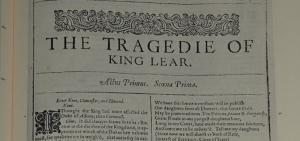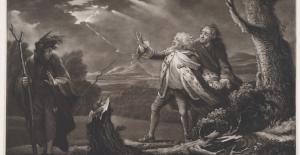 What does it mean, theologically, to grieve a lost future?
What does it mean, theologically, to grieve a lost future?
I have been doing some genealogy work lately, and found the story of an ancestor named Mathias. He immigrated as a bachelor from Germany, met a woman named Ann from Ohio, and married and settled with her on a farm in Indiana. They had a daughter, Elizabeth, and then six more children. When the seventh child was two years old, Ann died. The 1850 census reports him as the sole adult in the household, and it notes that the Elizabeth had “consumption.” She disappears from the record after that.
Some medieval Franciscan philosophers suggested that if with God all things are possible, but not all become actual, then it must be that God holds all the possibilities of world history in God’s own memory and imagination. An odd idea, but it has a certain appeal. I can’t be here and on the beach at the same time, because I have a body and live in time. Created life is created limit. Every road is a thousand roads not taken. But perhaps God can experience time and roads differently. What if all things, even those that could but don’t happen, remain real for God? Mathias imagined a future of growing old with Ann, with his firstborn coming to visit. Does that stay real for God, the way it once seemed to be a real possibility for Mathias?
David’s Lost Future
In the Old Testament, the great David’s first act as Israel’s uncontested king is to grieve a lost future. “They mourned and wept, and fasted until evening for Saul and for his son Jonathan, and for the army of the Lord and for the house of Israel, because they had fallen by the sword” (2 Sam. 1:12).
So much feeling gets packed into those opening verses of 2 Samuel. We’ve had a long build up to the final confrontation of David’s army with Saul’s, beginning all the way back at the latter’s anointing. David has been the boy hero of Saul’s confrontation with Philistia. Saul has been David’s mentor and father-figure. Their story is a roller coaster of passion, with madness, jealous rages, marriage, and finally the fierce manhunt across the wilderness.
And then there is Jonathan: David’s covenanted friend and secret collaborator. And yet, as crown prince and chief in Saul’s army, Jonathan is also David’s sworn enemy.
The Grief of the Once and Future King
When I read the first chapter of 2 Samuel, about the news of the King’s and Prince’s deaths arriving in David’s ear, I hear all that passion burst in a moment. David tears his clothes, and then he kills the messenger. It’s an odd way to act at the news that you have vanquished your enemies. But only if your enemy is nothing but an enemy, an obstacle to your life’s goal. Saul is not that, and Jonathan is certainly not that, for David. Yes, they have been chasing him around the country, seeking his death. But before that? Before that he embraced Jonathan in the field. He laughed and feasted with his adoptive father Saul while exchanging glances with Princess Michal across the table. They had a future full of love and life together. And that future ended on the slopes of Mount Gilboa.
It’s time for David to become the king; and he will. You can feel the pressure of the Hebrew bible building. We’re at a hinge here, and the door is about to swing wide open. David will become the greatest of earthly kings. He’ll become a figure on whom the Messiah is shaped. In later French and British lore, he’ll become the model for Arthur: the high and flawed king. David is the once and future monarch, the king whose second coming will be the opening of Israel’s messianic age.
And yet here, at this hinge, he pauses and grieves a lost future.
Hinges in Time
Key moments are hinges in time. A door opens to one side, and it’s full of mystery and possibility and strangeness, a new kind of hope, new relationships, new things to celebrate. But there is also the leaving of things behind. The suffering, grieving, over the future that will never be. Is there human adventure without any of that?
The Bible offers other hinges like this. Jesus at Gethsemane, acknowledging that his time with friends has come to an end. The ending of John’s gospel, when Jesus loves his friends to this tragic and complex ending. Or the 30 minutes of silence in the midst of the war in heaven. It’s the hinging open of a new door, every time. But that opening, like the chosen road, also involves leaving behind something hoped for.
“Very truly, I tell you, unless a grain of wheat falls into the earth and dies, it remains just a single grain; but if it dies, it bears much fruit” (Jn 12:24).
God and Matthias’s Lost Future
It’s late Advent in Christianland. Angels are heading our way, to visit shepherds with songs of praise. That broken seed of Israel’s grief is about to spring forth with fresh fruit.
And yet so much gets left behind. My ancestor saw his future evaporate into the humid Indiana air when he lost his wife and daughter. It was a hinge for the family. He lived long enough to meet his grandchildren, and to pass on the farming wisdom that his descendants still practice in the neighboring fields. I am indebted to him for more than my DNA. I imagine something of his resolve and strength came to us, as parents raised children knowing that “in this world you will have trouble.”
But what about Ann and Elizabeth, and that beautiful future than never came to be? What about Jonathan, who would have stood at David’s side all through the years of his reign? And Saul, who could have retired with honor and feasted through his old age at David’s table?
Perhaps we can say little more than the Franciscans did: all possible futures are actual for God. God remembers them in their deep truths, just as surely as God remembers the moments that came to fruition for us.
And maybe that’s enough.















